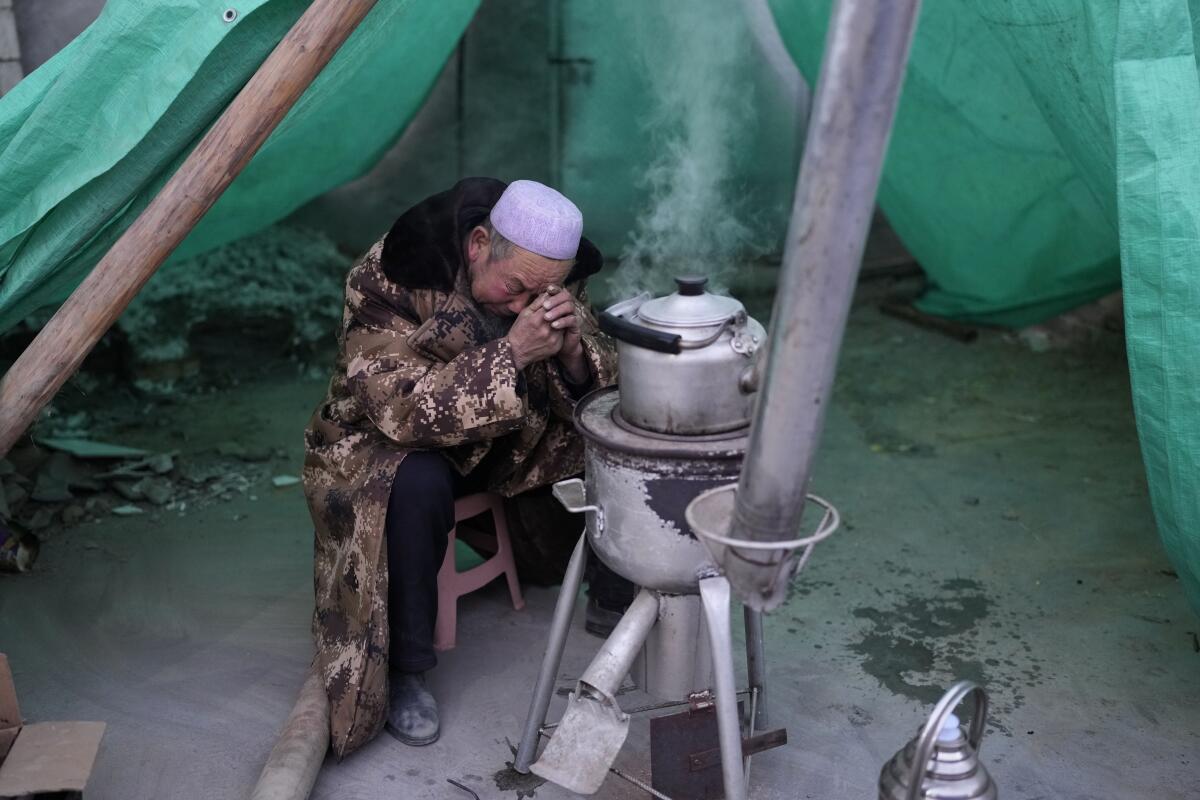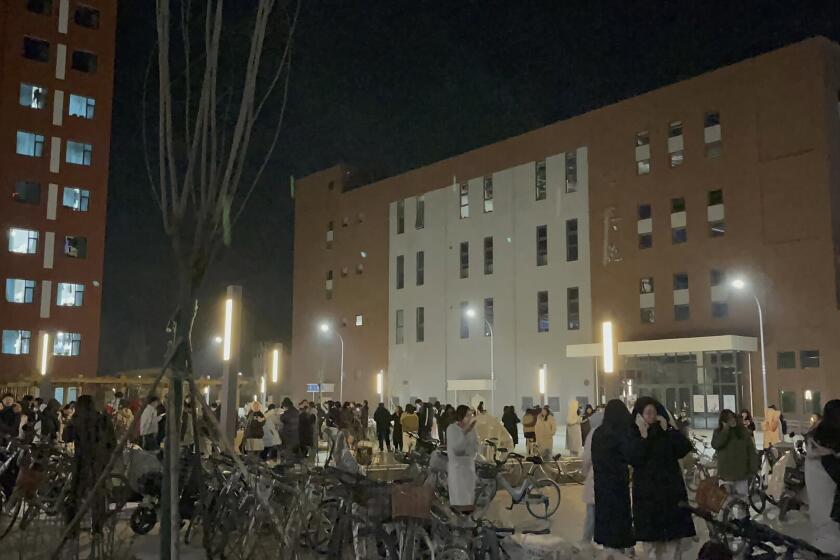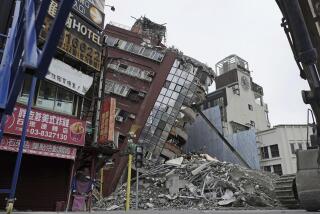China’s earthquake survivors endure frigid temperatures and mourn the dead

- Share via
YANGWA, China — Surrounded by destruction, survivors of an earthquake mourned the dead and endured a frigid cold in temporary shelters Wednesday, unsure how to rebuild their lives in the remote mountains of northwest China.
“Look at this,” said Han Zhongmin, retrieving some belongings with his wife from the ruins of their house, built six years ago in Yangwa village. “My house turned into this overnight.”
Houses caved in and crumbled in a Monday night earthquake that killed at least 134 people and injured more than 900 others. Most of the casualties were in Gansu province and the rest in the neighboring province of Qinghai.
Chinese officials said the quake had a magnitude at 6.2; the United States Geological Survey put it at 5.9.
In the predawn darkness, Ma Lianqiang stood next to the body of his wife wrapped in blankets in a tent-like temporary shelter lit by a single overhead light. His wife was hit and buried by debris in her mother’s house, where she had gone to stay because she was ill.
Ma and other members of his extended family survived despite extensive damage to their house in Yangwa, which is in Gansu province. His father pulled Ma’s son, whose back was slightly injured, out of the rubble. His uncle said they heard the earthquake and then the house started collapsing.
“We crawled out in fear,” the uncle, Ma Chengming, said.
Nearly 15,000 homes collapsed in Gansu and more than 87,000 people have been resettled, provincial officials said at a Wednesday news conference. Many spent the night in shelters set up in the area as temperatures plunged well below freezing.
Chinese state media say at least 127 have been killed in a magnitude 6.2 earthquake in the northwest, leaving residents in sub-freezing temperatures.
To the north, searchers in Qinghai were looking for 13 people missing in an area where landslides inundated two villages, partially burying homes. Excavators dug at the sea of soil, and rescue workers tried to break into some buried houses from the rooftops.
The number missing was down from 16 earlier Wednesday. The death toll in the province had gone up again Wednesday afternoon, according to a report by the state broadcaster CCTV.
Gansu officials said their search and rescue effort had basically been completed by mid-afternoon Tuesday. The province’s death toll remained at 113 and the number of injured rose to 782. Together with 198 in Qinghai, that brought the total injured close to 1,000.
Breaking News
Get breaking news, investigations, analysis and more signature journalism from the Los Angeles Times in your inbox.
You may occasionally receive promotional content from the Los Angeles Times.
Villagers in Yangwa bundled up against the cold and ate instant noodle soup being served in a tent of translucent green plastic sheeting. Han Fujun said more immediate concerns were on his mind than what to do about his destroyed home.
“It’s still a problem to get enough to eat and stay warm,” he said inside the makeshift shelter.
The earthquake struck in a poor, rural area that is on the eastern edge of the Tibetan Plateau and populated by several predominantly Muslim ethnic groups. It is about 800 miles southwest of Beijing, the Chinese capital.
We mapped the Los Angeles-area condos, apartment and office buildings that still need a seismic retrofit. Large buildings built before 1996 may be in need of a retrofit.
People wept as the body of Ma Lianqiang’s wife, covered with a carpet, was carried away on what looked like a metal bed frame after Muslim funeral rites held outdoors.
The death toll was the highest from an earthquake in China in nine years. Experts blamed the high toll on several factors, including the shallow depth of the quake and the lower quality construction in the poor region.
“Now our lives are what matters a lot,” Yangwa resident Ma Bajin said. “If we are not here, then there’s no such thing as survival.”
Ng Han Guan reported from Yangwa and Moritsugu from Beijing. Associated Press researchers Yu Bing and Wanqing Chen and video producer Caroline Chen in Beijing contributed to this report.
More to Read
Sign up for Essential California
The most important California stories and recommendations in your inbox every morning.
You may occasionally receive promotional content from the Los Angeles Times.












